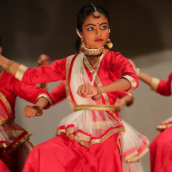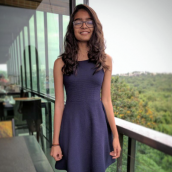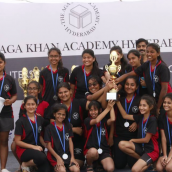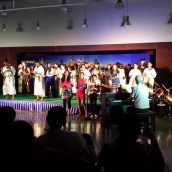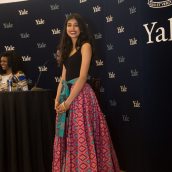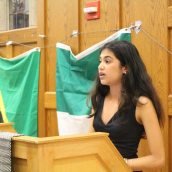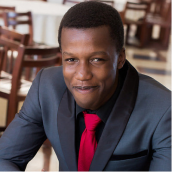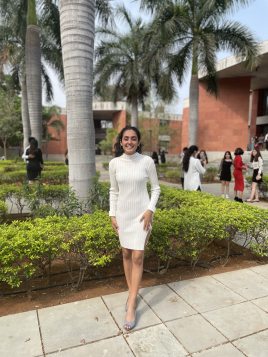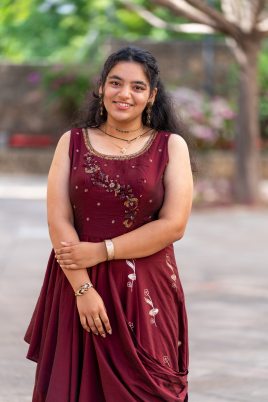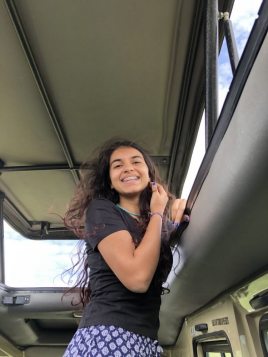Director of Academies Salim Bhatia's welcoming remarks to the 2017 graduating classes at the Aga Khan Academies in both Hyderabad and Mombasa.
Yamini Nibhanupudi (Class of 2014) - Looking at activism through a filmmaking lens
In an honest commentary on the creative process, filmmaker Stanley Kubrick said, “I do not always know what I want, but I do know what I don’t want.” The philosophy behind this method can be extrapolated to the lives of creatives, who wear many hats on their way to becoming who they are. Yamini Nibhanupudi graduated from the Academy in 2014 having focused on maths and sciences in the Diploma Programme. Since then she has roamed the highways of academia, always preferring the scenic route. She studied social sciences, stopped along the way to dabble in research and policy work, and ultimately discovered a passion for filmmaking. “For me,” she says, “deciding to stay in India and continue a life here is the best decision I made.”
Following her high school graduation, Yamini joined the Tata Institute of Social Science, Tuljapur, enrolling in their School of Rural Development. Here she studied political science, gender studies, history and sociology. During this time she worked with the Foundation for Democratic Reforms in Hyderabad, a think tank dealing with policy making. She also interned with Aga Khan Rural Support Program at Khandwa in Madhya Pradesh, working with farmers and marginalized communities. “I always wanted to work with people who spend every single day without any resources at their disposal, to work on the pressing issues that exist in India, issues that most of us never see through our rose tinted glasses.”
“I never lived under the illusion that I would be able to improve the lives of people in India,” she says, adding, “I would like to, but I honestly wouldn’t know where to start.” Writing her final paper as an undergrad, she realized how she could authentically contribute to society. Yamini wrote her dissertation on ‘Gender Roles in the Telugu Film Industry.’ As she delved deep into the paper, she recognized her long held passion for film. She was accepted by TISS Mumbai’s School of Media Studies the same year.
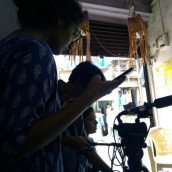 Her choice was validated almost immediately, getting to work at a production house in Mumbai at the end of her first year, and then winning a competition to get a one-minute silent film funded. “A Mute Point” was then screened at the 16mm Film Festival. “It’s been quite a ride since graduating in 2014,” she says looking back, “and I honestly wouldn’t have it any other way.” She is on track to graduate with a Master’s in Media & Cultural Studies in May 2019.
Her choice was validated almost immediately, getting to work at a production house in Mumbai at the end of her first year, and then winning a competition to get a one-minute silent film funded. “A Mute Point” was then screened at the 16mm Film Festival. “It’s been quite a ride since graduating in 2014,” she says looking back, “and I honestly wouldn’t have it any other way.” She is on track to graduate with a Master’s in Media & Cultural Studies in May 2019.
Yamini is a strong proponent of public and government universities. She believes that they are the gateway to a range of education opportunities available in India, and creates an avenue to meet people from across the nation. “I think most people who go to IB schools don’t see India as a viable option to study for their years in university,” she says. “Unfortunately, most of them never truly realise the kind of exposure that you can receive here.” She later adds, “A lot of people might argue that they would gain more exposure and a better understanding about the rest of the world by going abroad. But they have never stepped out of their city in India and a lot of them rarely have friends out of their social class or caste in the country. I've been lucky to learn from wonderful people about the work they've done or that they intend to do with their lives, and India in itself has such wonderful and diverse cultures that I would probably never have ever been exposed to had I studied elsewhere.”
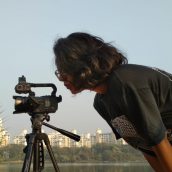 90% of graduates from the Aga Khan Academy Hyderabad have gone on to study abroad, and several students join the IB programme explicitly to have the opportunity to study in the West. Yamini says that an IB education is more than that, and that an education at the Academy was more significant to her than just a stepping stone. “IB teaches you to think critically, and to question everything,” she says. “In a country where rote learning is so persistent, it existed as a breath of fresh air for me.”
90% of graduates from the Aga Khan Academy Hyderabad have gone on to study abroad, and several students join the IB programme explicitly to have the opportunity to study in the West. Yamini says that an IB education is more than that, and that an education at the Academy was more significant to her than just a stepping stone. “IB teaches you to think critically, and to question everything,” she says. “In a country where rote learning is so persistent, it existed as a breath of fresh air for me.”
“The Academy prepared me for a lifelong affair with academia,” she confesses. “I learned to love research to the extent that I have considered going into teaching and pursuing a PhD.” Yamini is quick to add that her experiences at the Academy go beyond just education. “Being part of a community like this, which continues to check up on its alumni, and which still continues to be there for us years after we have graduated, is an immense source of pride.”
Students and professors at TISS take social activism to be an integral part of being an educated member of society and are involved in forcing change on their campuses, their cities and their fields. “I've learnt my place in this country from both a social and political standpoint,” says Yamini. “If I look back at 2018, I can see the fight that so many people have been a part of, whether it is about caste issues, the landmark judgement scrapping section 377, to the horrific [Transgender Persons] bill of 2018 that was passed, marginalising the very community it was meant to protect. I see my peers around me fighting every day and I can do nothing but support and document them.” Using her passion for filmmaking, Yamini hopes to make a responsible, self-aware contribution to these movements. “I would like to be able to tell their stories with them, with their permission, and with their direction. I know for a fact that I can’t, and in fact shouldn’t be their voice, but I can do everything in my power to back their voices.”
 Yamini’s education has been broad and diverse, incorporating the complexity of sciences, the gentility of humanities and the adroitness of cinema. But unlike the Kubrik-ian creative littering the highway with discards, she uses detours to inform her work and her personality. “I never really had any clarity about what I wanted to do,” she says, "but now that I do, I’m pushing towards it with all the energy in me.”
Yamini’s education has been broad and diverse, incorporating the complexity of sciences, the gentility of humanities and the adroitness of cinema. But unlike the Kubrik-ian creative littering the highway with discards, she uses detours to inform her work and her personality. “I never really had any clarity about what I wanted to do,” she says, "but now that I do, I’m pushing towards it with all the energy in me.”
Written by Ajay Sundaram
Anahita Aman: Grateful for the Academy’s holistic approach to learning and development
Anahita Aman is in her seventh year at the Aga Khan Academy in Hyderabad. Having started there in grade 5, she is now a grade 11 student in the Diploma Programme. She is wise beyond her years and yet has a youthfulness that is contagious. She is full of hopes and dreams and strives to get the most out of her days at the Academy so that she can ultimately give back to the community and society at large.
For Anahita, the strongest part of the Academy is its holistic approach to student development. “They don’t just focus on the academics but also on sports, music and art – so in that way it’s a really holistic approach to learning, and it’s helped me develop into a multidimensional and multifaceted person,” Anahita says. This holistic approach means that she gets the freedom to explore her passions, and that excites her. She loves music – whether it be singing, playing the keyboard and tabla, or learning Indian dance. She is also a self-proclaimed feminist who is passionate about gender-based violence, gender equality and education for girls. She recently had the chance to fuse these two passions as part of a personal project requirement at school. She wrote, composed, and performed her own songs with powerful messages on these topics.
This year, Anahita made a shift to the residential programme and says that it has been a great learning experience – one that has forced her to come out of her shell. She has learned how to better manage herself and her time, and she has become more independent and more social. “I learned how to adapt to my surroundings, how to adjust with other people and to make things work.” But Anahita feels that she has grown in other ways also, and this stems again from the holistic approach of the Academies.
“Service and action is mandatory as a part of the curriculum…they emphasise the need for community awareness, for concern about society, and they emphasise the need to give back and to make positive and effective contributions to society.” For the service and action component of the Academy’s programme, Anahita was part of fundraising teams that raised money for nearby government schools to install water filtration systems and purchase sports equipment, among other things. “We don’t look at it as an obligation or a compulsion but we do it out of passion, and the Academy gives us that passion, that feeling or need to give back to society,” Anahita says. She is proud of her service accomplishment along with many others that the Academy has also helped her to achieve.
She is a member of the journalism club and has made great strides in her writing skills, including how to better articulate her thoughts. She has taken part in a national sports tournament where she represented her school in football and track and field, having won a silver in high jump. And she has been part of the Model United Nations where she not only got a real sense of how the world works, including how people live and what the prevalent issues are, but also developed skills in public speaking, problem solving and knowledge application. Anahita says, “The Academy helps us apply this knowledge to real-life situations.”
The holistic approach to learning and development that the Academy takes is something that Anahita believes makes it unique. But there are other things too. For one, there is no spoon-feeding. Instead, you’re taught how to learn and how to learn on your own – the approach is not one of rote learning but rather application of real-life situations. She’s also really happy that the Academy creates a safe space. “We have that sense of comfort that there’s no pressure of performing and we have the space to experiment with things. We don’t feel pressure at any point, we don’t feel stressed, and we don’t look at exams as huge challenges but as small barriers that we can overcome.”
Anahita also believes that the Academy’s mission and vision are both important and inspiring. In fact, it was the mission that attracted her parents to send her there. “It teaches us to be culturally rooted and diverse. It teaches us how to accept our differences and so we have this feeling of community,” says Anahita. The Academy also aligns within the framework of the International Baccalaureate (IB) programmes. As such, the attributes of its learner profile are very powerful in instilling life values. All of this is what she believes make it distinct from many other schools.
Anahita credits the Academy for helping her become less shy and less self-conscious. She says, “I feel like I have the comfort to be who I am and to express myself freely. I feel acknowledged and I feel I’m being appreciated for who I am.” When asked if there was any particular person at the Academy that played a big part in this, or whether there was someone she really looks up to, she says that she doesn’t account only one person as a role model but instead looks to the many amazing people she has met along the way for their different but equally important attributes. “I may like someone’s enthusiasm, someone’s hard work and dedication, the way they work with people, the way they bring people together,” Anahita says. “I like to get inspired by these characteristics, by these attributes from different people and imbibe them into myself to be the best person I can be.”
Anahita’s future looks bright. While she is still unsure of what exactly she wants to do, she has learned how to articulate her passion, and that in itself has given her a sense of determination. She hopes to be able to combine her interests in music and literature with humanities and gender studies. She imagines perhaps becoming a poet or musician and incorporating important messages into her work. “I think the Academy is giving me the space and the platform to explore what I’m actually interested in,” Anahita says, “and I think that will lead me to my ultimate ambition.”
By Ceisin Popat
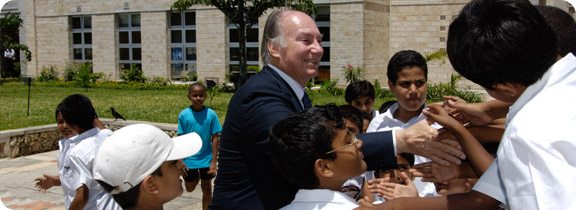
Speeches
Keynote address by Her Excellency Margaret Kenyatta, First Lady of the Republic of Kenya, at the 10th graduation ceremony of the Aga Khan Academy Mombasa
Speech by Salim Bhatia, Director of Academies, at the 10th graduation ceremony of the Aga Khan Academy Mombasa
Graduating student Joshua Ekirikubinza's speech, given on behalf of the Aga Khan Academy Mombasa's Class of 2015
Welcome address by Director of Academies Salim Bhatia at the AKA Hyderabad and AKA Mombasa 2015 graduation ceremonies (conducted simultaneously)
Keynote speech by Dr Matt Reed, CEO AKF India at the 2015 graduation ceremony in Hyderabad
Welcome address by Salim Bhatia, Director of the Aga Khan Academies network, at the inauguration of the Aga Khan Academy Hyderabad
Speech by His Highness the Aga Khan at the inauguration ceremony of the Aga Khan Academy Hyderabad
Speech by Director of Academies, Salim Bhatia, at the graduation ceremony at the Aga Khan Academy Mombasa
Keynote speech by Mr Jan Mohamed at the graduation ceremony at the Aga Khan Academy Mombasa
Remarks by His Highness the Aga Khan at the Academy of Sciences in Lisbon
Speech by His Highness the Aga Khan at the foundation stone-laying ceremony of the Aga Khan Academy Dhaka
Salim Bhatia's welcoming remarks at the foundation stone-laying ceremony of the Aga Khan Academy Dhaka
Speech by Dr Hossain Zillur Rahman at the foundation stone-laying ceremony of the Aga Khan Academy Dhaka
Welcome address by Salim Bhatia at the foundation stone-laying ceremony of the Aga Khan Academy Kampala
Speech by H.E. Yoweri Kaguta Museveni at the foundation stone-laying ceremony of the Aga Khan Academy Kampala
Remarks by His Highness the Aga Khan at the foundation stone-laying ceremony of the Aga Khan Academy Kampala
Salim Bhatia's welcoming remarks at the residential campus foundation stone-laying ceremony, Aga Khan Academy Mombasa
Remarks by His Highness the Aga Khan at the foundation stone-laying ceremony of the residential campus, Aga Khan Academy Mombasa
Speech by the Chief Minister at the foundation-stone laying ceremony of the Aga Khan Academy Hyderabad
Opening remarks by Salim Bhatia at the foundation stone-laying ceremony of the Aga Khan Academy Hyderabad
Remarks by His Highness the Aga Khan at the foundation stone-laying ceremony of the Aga Khan Academy Hyderabad
Remarks by His Highness the Aga Khan at the groundbreaking ceremony of the International Academic Centre of Excellence, Dar es Salaam
Pages
Joseph Munyambanza: The story of a conqueror
As we sat for our lesson on a sweltering Tuesday afternoon, there was anticipation for the upcoming week-long break, obstructed only by the last lesson of the day. We sat for a while in a lazy stupor before our speaker arrived humbly apologising for his delay. Joseph Munyambaza was calm and composed as he began his initial talk on disparities of living. Despite appearing to be an average man who started by talking of ordinary sundries, he informed us that he was raised as a refugee and that it was education that propelled him to the position he is in today.
He began by narrating to us that life was free and full of enjoyment in the Congo. “There was plenty of food, I was always playing…” he recalls as he spoke of his six-year old self. Due to his age, he is now aware that he was shielded from most of the atrocities that must have taken place. His older siblings on the other hand, were not as fortunate. “My brother, who was a teenager at the time, was greatly disturbed by the events that took place…” Eventually, his older brother sought comfort in alcohol in an effort to forget what he had seen. Joseph’s family relocated to refugee camp in Western Uganda in a place called Hoima. Life was different and evidently, it was hard. The life of abundance and freedom was long gone and now the life of lack and want was all that there was. You can imagine the terrible living conditions in the refugee camp which was congested and dangerous. As he grew life seemed to eventually settle when tragedy struck. Joseph’s older sister passed away only a few days before exiting the refugee camp to attend university. What really moved me was the fact that she died under preventable circumstances. His sister died because his family did not have sufficient funds to pay for treatment.
This turning point propelled him to getting a placement in a high school outside the refugee camp where he was to begin to establish his academic prowess. He further explained that he knew how important his opportunity was so he would remain focused in his studies at all costs. Things were running smoothly throughout his years in high school with his school fees sorted out by the UNHCR. He was determined to also give opportunities to other refugee children who, just like him, were so full of potential. “When I was in my second year of secondary school, my friends and I wanted to enable other refugee children to access education. And so we started COBURWAS, a youth organization that represents Congo, Burundi, Uganda, Rwanda and Sudan. Refugees in the refugee camp we lived in came from these countries and we wanted to have a shared solution. All youth came together to think of solutions. Though we had many challenges we realised that lack of access to education was more dangerous. We started tutoring, which I did to enable children to get good grades and feel motivated to love school. We also worked for people to raise money to buy exercise books for the most vulnerable children in our midst. We were a club at first, but with time our programs expanded and we became a community-based organisation. The refugee community was of great help because they supported us with the little available and it meant so much in our small start.”
However, in his fourth and most senior year, his scholarship was withdrawn. “My education was initially supported by UNHCR in senior one but when I went to senior two they sent letters that UNHCR does not have more money to support education. Fortunately, a friend called Eric Glustrom who was starting an organisation helped me to complete senior four.” Even with a graduate certificate under his belt, he was unsure of what was to come next. Then, another whirlwind of events took place such that he was admitted to the ALA (African Leadership Academy) located in South Africa. This is an institution that is internationally recognised for producing innovators and entrepreneurs who are sure to make a positive impact within their home countries. Joseph says, “I had no dream of getting to a great school like ALA. I was already extremely grateful to be in my school that was the best in the district. And so even after being accepted to into ALA I still did not believe it until I landed in Johannesburg and was handed the key to my room. It was more than I could have ever dreamed of. And when I reached at ALA I wanted to be the best I could as a student, an ambassador to my fellow youth in the refugee camp and do well in class.”
All in all, his story was able to bring out the extent of the disparities of lives outside our own. The concept of war, forced migration and other forms of hardship is one that cannot be explained in a short period of time but were nevertheless highlighted in his talk. It is fascinating how a life can change simply as a result of joint efforts and self-motivation. By the end of his talk it was crystal clear that according to Joseph Munyambanza, education is a powerful tool.
By Bijou Mwaura, DP1
Ruhi Kamal Manek (Class of 2016): Advocating for Africa
Ruhi Kamal Manek, an alumnus of the Aga Khan Academies in Mombasa and now a sophomore at Yale University in the United States, took away one enduring lesson from the Academy: the importance of engaging in thoughtful and careful consideration of diverse opinions. She explains that it was her time at the Academy that forced her to reexamine her old-world views and believes that her new way of thinking as a citizen of the world was borne of her stay in residence at the school:
“Living with people from so many diverse backgrounds helped me appreciate differences in people. This experience further helped me feel comfortable interacting with people from diverse backgrounds and diverse cultures at Yale.”
Ruhi was born in Nairobi, Kenya and grew up in the small town of Eldoret. It was her desire to learn and challenge herself more that made her apply to the Academy.
“I could not think of a better place to do that than at the Academy,” Ruhi states. “Being admitted to the school was the beginning of a transformative journey for me - a defining moment in my academic and personal life.”
The Academy places immense importance on meaningful public service. Ruhi participated in numerous voluntary undertakings but it was involvement in the annual school-based deworming program in the impoverished Bombolulu area of Mombasa that had a lasting impact on her. Under this program, school children receive an oral dose of deworming medicine designed to lower their risk of infection by worms and thus enhance their health and school productivity.
“The experience opened my eyes,” Ruhi says. “The thought that something so trivial as administering a few drops of medicine in a child’s mouth can transform that child’s future was inspiring to me.”
Involvement in this program inspired Ruhi in many ways. Watching the children joyfully engage with life forced her to reflect on values of humility, modesty and gratification:
“As I stood among the children, I felt as though my heart had grown twice as large, making space for these beautiful souls. I was filled with an inexplicable amount of joy as I marveled at the contentment and optimism around me. Despite the conditions in which the children lived and learned, they were radiating with happiness. I was in awe. The whole experience reminded me of a quote by the Buddha: ‘The cessation of desire is the cessation of suffering.’”
After this experience at the Academy, Ruhi continued her volunteer work at Yale. She is part of the TEDxYale team and helps to organize seminars and conferences. She is a member of Yale UNICEF and is involved in fund-raising efforts to make a difference in children’s lives globally. Committed to women’s rights regarding education and leadership roles, Ruhi also joined the Yale chapter of the Circle of Women, a non-profit organization “that educates, inspires and empowers women to become leaders and peacemakers.”
Additionally, Ruhi is involved in developing a wellness curriculum for a girls’ secondary school in Orkeeswa, Tanzania, which promotes the ideas that healthy students are better learners and that focusing on wellness now can produce huge intergenerational benefits.
“My first year at Yale has undoubtedly been enhanced through my participation in activities that I have long been passionate about,” states Ruhi. She unequivocally credits the Academy’s International Baccalaureate (IB) curriculum and the residential program for her growth and personal development. “My journey at the Academy was one of the most intense yet fulfilling growth periods of my life. I think it is safe to say that it played a key role in helping me develop the person I am today.”
When asked what her aspirations are for the country of her birth, Ruhi radiates determination. “I want to help redefine the way in which the rest of the world views my country, and more particularly the African continent. I want to be an active agent in ensuring that our stories are no longer told for us but by us.”
She is also determined to promote education in her country. “I want to tackle the issue of the lack of education. I value nothing more than the education I have been so privileged to receive and the many opportunities that have come my way because of it. I wish to help provide the same for as many people as I possibly can in my country of origin and beyond.”
By Perviz Walji
Newsletter readers please click here to return to the newsletter (browser version)
Joshua Ekirikubinza's Speech - AKA, Mombasa's Graduation, 2015
Teachers, I would like to begin with you. I am not going to thank you right now. However, I will start by saying sorry. For every time we ducked when we saw you coming down the hall, knowing we were not going to hand in that piece of homework. For every time we extended that deadline so far that it became inexistent. For every time we treated the piece of paper we are about to receive as your problem and not ours, and for every opportunity to thank you that we missed, thank you for being there from the beginning and here with us at the very end.
Parents, thank you. Those two words come nowhere near expressing the gratitude I know that every single student seated in front of you feels. Thank you for the support, whether financial or emotional. Do not worry; the product of your labor is awe-inspiring. In front of you sit the pioneers of the next generation, the heroes who will shape the world and leave a resplendent legacy for decades to come. DP2s, I just made a lot of promises to your parents, your job is to turn those incredibly romantic notions I sent flying their way into reality. And while it may seem like I just placed an immense task on your shoulders, I only ask of you what you are more than capable of.
In two years you have overcome every single obstacle that the IBO managed to throw at you, even though I know you imagined they sat in a boardroom discussing how to make your lives as difficult as possible. Now you are at your graduation and I know a lot of you are probably wondering what it was all for. I sincerely hope you do not expect me to give you that answer. In fact I hope you realize that no one in this room or outside it can give you that answer. As cliché as it is to say, the only person who can answer that question is you. Why did you decide to do a program renowned for its rigor? I hope it is because somewhere inside yourself you believed that you do have the ability to do anything you set your mind to; which would make everything I promised earlier a piece of cake.
So if I have not made myself clear yet, the world is yours. It is yours to shape and mould, yours to save and re-vitalize or yours to ignore and let crumble. If there is one thing you should know going forward it is that you no longer have the luxury to sit back and watch. You had about eighteen years of your life to do just that and I hope you enjoyed it. Soon the decisions about the world we live in will be left up to you. Make sure that when you are attending the next generation’s graduation the legacy you hand over is one that you are proud of.
The way to such a legacy is of course no walk in the park. There will be challenges, but the greatest one, I believe, is the day you question how special you really are. The day you stop believing you can impact the world around you is the day that ability is eternally lost you. Do not let the world tell you what you can and cannot do. Do not subscribe to the bigotry and intolerance that runs rampant throughout the world, you are far too intelligent for that. Do not gauge your abilities by comparing yourself to someone else. If you look to your left or right you will find a classmate and a team mate, not your competition. You do not benefit from being better than the person sitting next to you. I do not often quote people because I am ambitious in that I hope to create a few of my own one day, but Ernest Hemingway once said “There is nothing noble in being superior to your fellow man; true nobility lies in being superior to your former self.” Thus the key to your success does not lie in being better than everyone but, and the administration in no way coerced me to say this, in having a growth mindset. Please do not be that dentist who argues you are more important than the engineer.
Be accepting of the people around you. You cannot hope to change the world if you cannot even begin to accept the people within it. We are different. That is a reality you will have to accept. Also, please remember when you re-shape the world you affect everyone. Every culture, every race, every ethnicity and every religion. It is a complex puzzle, remember that. You can only solve it if you understand it.
Do not your let your education amount to just a piece of paper. As the incredible sagacious Albert Einstein said, “Education is what remains after one has forgotten what one has learned in school.” When you read that over 8,000 people died in an earthquake in Nepal earlier this month, do you simply let that statistic ring through one ear and out the other? Or do you let such facts inform your decisions about what you want to do to change the world? Do not think accumulating wealth is the way you change the world either. If you think I am being dishonest then how about you consider that there are over 5 million millionaires in the US alone. There is a treat in it if you can name more than 100 of them. I believe you know less than 100 names because they have not done enough to change the world. Martin Luther King Junior died without any financial assets at all or a will, almost 50 years later we still revere him. In the end you deserve to have your name written down in the annals of history, not a checkbook.
Finally remember as wonderful as you are, there is only one of you. You are one piece in a seven billion piece puzzle. Try and fit as snuggly as possible, keep your elbows, knees and feet in a position that does not bother anyone else.
So as I conclude this intentionally overly verbose speech, I leave you with a simple fact. Those are crazy enough to believe they can change the world, are often the ones who do. So here’s to the crazy ones - we can disagree with them, hate them, love them, quote them glorify or vilify them. About the only thing you cannot do is ignore them because they change things. They push the human race forward. I hope that you are all crazy enough to do it.
Onwards and Upwards
Congratulations to the Class of 2022! We are so proud of you and cannot wait to see what you do next. As we welcome our new graduating class to our alumni community, we asked four distinct graduates from the Aga Khan Academies in Mombasa and Hyderabad about their journeys and aspirations.
Imra Dawoodani, AKA Hyderabad
Plans to join the University of California, Berkeley for a BSc in electrical engineering and computer science.
What drives you? What is your superpower?
The impact of experiences. Experiences have moulded the most intricate details of the world as I see it. Whether new, old, unexpected, or a planned experience, each circumstance prompts the creation of a new approach within me, defining my ability to adapt to a multitude of situations. Sometimes it outlines my path, in other cases it intrigues me to look for one.
How did the Academy impact you?
It's been a journey. Exposing me to every emotion one could feel, pushing me forward every second because life never stops, and opening routes to a variety of opportunities, the Academy has thoroughly done its part in making me realise that I'm the only one who can take a call for myself.
You’re a new addition to the crayon box; what color would you be and why?
Grey may not seem like the ideal choice, but it depicts my conflicted self. I'm the one trying to figure out light and darkness, ebbs and flows, the balance between emotions and practicality. A simpler derivative to this conclusion would be my utterly annoying indecisiveness. I'd be the one to mix sushi and dal however horrendous it sounds because I just cannot choose what I want to eat today.
Jacintha Thota, AKA Hyderabad
Plans to join the London School of Economics and Political Science for a BSc in politics and economics
What drives you?
Two things that have driven me for a very long time are fascination and long-term goals. I am someone who just loves the idea of learning new things. Whatever I put my mind to is always driven by a sense of love, a sense of wonder, whether that's my academics or my extra curriculars. That fascination keeps me going. When it comes to long-term goals, I do know I want to work in the field of economics when it comes to equity or sustainability and that has shaped my interests and path.
How did the Academy impact you?
The most profound impact has been that it has shown me the world is so much bigger than the bubble that you grew up in. It brought together people from different cultures and socioeconomic backgrounds. It has shaped my goals to be community oriented. And it has shown me that being a good person is having the right mindset and being tolerant to new ideas and new people.
What challenges did you face and how did you overcome them?
COVID-19 lockdowns and the kind of terror it put around the world when I was doing my DP journey meant it was incredibly hard to stay motivated when people were literally dying around you by the thousands. It left me with a sense of cynicism and feeling really demotivated. But actually, coming back to the academy and being around people again reminded me just how much I valued this community. It definitely helped overcome the sense of dread I had started to feel during those 18 months or so.
Khushi Bajaria, AKA Mombasa
Plans to join the University of Miami to study health science (pre-med
What challenges did you face and how did you overcome them? What was your best mistake?
I faced the challenge of making friends because of the way I felt the need to please my friends continuously. However, as I focused time on my goals, I eventually became part of a diverse group of friend groups. I also first thought it was a mistake that I ignored the warning from my personal project coordinator to not go ahead with my idea as it may impact my grades if I fail in it, however, as I believed in the impact it could make and communicated with the right people, I was able to be successful in it and make a greater impact than expected.
How would you describe success and what do you hope to achieve in the next 5 years?
Success is a never-ending mountain with large rocks of joy and glee that help one stay stable, and numerous smaller rocks that keep pushing one to slip backward in their journey of meeting their expectations. The soil of the mountain is then like family and friends that support and help piece part of this journey together to make success what it is. I hope to have completed my bachelor's degree in health sciences and my first year of medical school. I also hope to have expanded my project (teaching Grade 5 to 7 students in how to create and help an eco-friendly microscope). I hope by then, I shall have taught the developmental process in more than fifteen schools in different countries through a team internationally.
Mishal Lalani, AKA Mombasa
Plans to join Middlebury College to major in microbiology and biochemistry and a minor in geography and sociology
What are your plans after graduation?
Firstly, I plan to sleep, have fun and just wind down all the stress that we have been put through for the past two years. I also look forward to and plan to spend time with my family before I leave for university in August, as well as the friends who live around me. Similarly, I hope to do a short internship at the Aga Khan Hospital in Mombasa just to grasp the healthcare environment as that is what I hope to pursue in the future.
What drives you? What is your superpower?
What has particularly always driven me is the community around me. Seeing the community improve when I help out or different community projects help out makes me want to go the extra mile and do more.
How did the Academy impact you?
The Academy made me an all-rounded individual and made me a global citizen. Being the first cohort to go on the exchange programme, I felt very privileged to be at the Academy and to have access to such amazing opportunities that will indeed be spoken about and recognised for the rest of my life. I made the most special memories at the Academy. Most importantly, the Academy taught me that no matter who I am or where I come from, I can make a change if I want to. This was the biggest lesson for me, and I believe it will take me far in life.
